Omidyar Network has unveiled a groundbreaking $30 million investment aimed at addressing immediate risks associated with artificial intelligence (AI), steering away from existential AI concerns, and promoting inclusivity in AI discussions. This philanthropic effort seeks to bridge the gap between the excitement surrounding AI and the apprehension it instills.

The significance:
Philanthropists are playing a pivotal role in reshaping the narrative around AI, and Omidyar’s substantial contribution aims to diversify the participants engaging in AI discussions.
Public sentiment in the United States has consistently expressed distrust toward tech giants and apprehension about the impact of AI. Despite this, Congress has yet to allocate substantial funding or establish safeguards and support mechanisms for workers affected by generative AI. Omidyar Network’s initiative is motivated by concerns about concentrated AI markets and Congress lagging in comprehending generative AI.
Recent Developments:
Last month, Vice President Kamala Harris announced a commitment of over $200 million from ten leading foundations toward the development of public-interest AI. Omidyar Network’s investment is the first to be deployed, aligning with the Mozilla Foundation’s publication of AI funding principles.
Mike Kubzansky, CEO of Omidyar Network, emphasized that the funding aims to foster a “more collective, cross-sector approach to generative AI.”
Details:
Omidyar Network conducted focus groups in the fall, overseen by FGS Global, to determine project priorities. Feedback indicated that immediate harms such as “racial bias, deepfakes, and protecting intellectual property” should take precedence over existential risks.
Initial partners and projects include the AFL-CIO Technology Institute, receiving funding to bring worker experiences of AI to Congress and statehouses. Humane Intelligence, led by Rumman Chowdhury and Jutta Williams, will scale its AI auditing and evaluation work. The Collective Intelligence Project will host “AI Alignment Assemblies,” democratic forums to gather public perspectives on AI. The Economic Security Project and Vanderbilt Policy Accelerator will develop governance models for AI, including public options for generative AI.
The broader context: AI developers are experiencing a shift, favoring accelerated development over deceleration. OpenAI’s recent board shake-up signals a long-term shift away from its original non-profit foundation.
Omidyar Network emphasized that the funding will contribute to the development of “generative AI infrastructure,” elevating diverse voices in AI development and governance while promoting innovation and competition.

Amanda Ballantyne, director of the AFL-CIO Technology Institute, stressed the importance of involving end-users, particularly workers, in AI design to ensure its effectiveness, safety, and efficiency.




